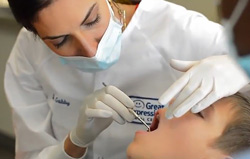DSO membership allows dental specialists to do what they do best.
By Laura Thill
 Dentists – including dental specialists – appreciate the need to market their business and grow their patient base. But, that’s not necessarily what attracted them to the industry. Specialists, like their general dental counterparts, foremost seek to provide quality patient care. And, as more and more dentists join dental service organizations, which oversee much of the patient referral and marketing responsibilities, dental specialists can get busy doing what they do best: taking care of patients.
Dentists – including dental specialists – appreciate the need to market their business and grow their patient base. But, that’s not necessarily what attracted them to the industry. Specialists, like their general dental counterparts, foremost seek to provide quality patient care. And, as more and more dentists join dental service organizations, which oversee much of the patient referral and marketing responsibilities, dental specialists can get busy doing what they do best: taking care of patients.
Dr. Gabriela Hricko, a New York-based orthodontist, regards her role as an orthodontist to “provide outstanding orthodontic treatment to our patients.” As a member of Great Expressions Dental Centers (GEDC), she can count on a lot of orthodontic referrals from other offices within the DSO. “That way, I don’t have to depend on my local general dentists as much as a small specialty orthodontic practice would,” she points out. “I am also able to refer to other specialists in the GEDC network when it is necessary to help with patients’ completion of orthodontic care, such as oral surgery.”
Indeed, prior to joining a DSO, Hricko experienced typical small-practice challenges, such as having to report to a doctor with limited business expertise, who ignored well-founded recommendations. “There was no career path,” she recalls. In contrast, “at GEDC we have a doctor career path and receive support from various departments. For instance, the human resources department screens, orients and provides benefit support to our staff. The information systems department provides and maintains our practice management system. The accounting department pays the bills and writes the payroll. And the marketing department helps tell the community about the great services we provide and helps us create a relaxed office environment.
 “One thing that makes us unique at GEDC is the organization’s National Doctor Panel – a nationally recognized doctor panel,” she continues. “Each person on the panel is a dentist, orthodontist or specialist with years of clinical experience. They set the standards for clinical excellence and develop GEDC’s philosophy of care, which allows us orthodontists to ensure we are giving the best care to our patients, while ensuring complete autonomy.” Likewise, if a dental specialist is interested in a product that is not available through an approved vendor, specialists can work directly with their clinical leaders to ensure “our patients are getting the absolute best when it comes to their care.”
“One thing that makes us unique at GEDC is the organization’s National Doctor Panel – a nationally recognized doctor panel,” she continues. “Each person on the panel is a dentist, orthodontist or specialist with years of clinical experience. They set the standards for clinical excellence and develop GEDC’s philosophy of care, which allows us orthodontists to ensure we are giving the best care to our patients, while ensuring complete autonomy.” Likewise, if a dental specialist is interested in a product that is not available through an approved vendor, specialists can work directly with their clinical leaders to ensure “our patients are getting the absolute best when it comes to their care.”
For Dr. Sharlene Yap Starkman, a Florida-based pediatric dentist, her membership in GEDC allows her to “focus on the quality of care and entire dental health of each and every patient,” rather than investing time marketing her practice and building and maintaining a referral base. In addition to being able to practice dentistry without having to worry about the financial climate, working within a DSO provides her with “the opportunity to practice true, multi-specialty, comprehensive dental care by working with all facets of dentistry,” she says. “I can ensure that each of my patients have continuity of treatment, and I can follow my patients to different specialties, from beginning to end. I am able to travel to several different offices and build a much wider global practice instead of limiting myself to one office and one patient base.
“Great Expressions Dental Centers is a unique DSO because of their ladder of leadership and opportunities presented to specialists,” Starkman continues. “As I continue to grow with GEDC, opportunities become available to assume a larger leadership role and become an active member in the dental and neighborhood community.
“Great Expressions puts a premium on continuing education to ensure that doctors and dental care professionals stay on the cutting edge of our fields,” says Hricko. “As an orthodontist, I want to be up to speed on the newest clinical advances. A while ago, we were introduced to Invisalign. GEDC’s National Doctor Panel reviewed the service and then introduced it to the doctors with in-person meetings, training, certification and more. This has allowed me to offer the best service to my patients to address their specific needs.”
Sales reps and DSO specialists
For sales reps building a relationship with dental specialists, dental service organizations can offer a source of support. “Suppliers can look forward to a large acceptance rate of quality supplies that translate to a global acceptance of their product on hundreds of offices as opposed to just a few,” says Starkman.
At GEDC, there are specific decision makers sales reps can contact, helping them avoid reaching out to the wrong dental professionals, notes Hricko. “If for some reason a rep’s product is declined by GEDC’s national doctor panel and chief clinical officer, he or she will get valuable clinical insight as to why it was declined,” she explains. “Once a product is reviewed and approved by the clinical team, it can be introduced to all offices that need it through Great Expressions Dental Centers University, leading to network-wide acceptance.” Finally, GEDC has built-in protocols for educating patients on good oral care solutions. “This is based on the way the patient prefers to be communicated with, such as an in-lobby TV service, a digital patient newsletter and community events and in-office art. This helps sales reps because the same, consistent message is delivered to all doctors, dental professionals and patients.”
Looking ahead, Hricko anticipates seeing more and more solo practice orthodontists – as well as other dental specialists – join DSOs. Not only do DSOs offer specialists a built-in referral network, they often provide a diverse range of patient referrals as well. “The referrals I receive from the GEDC network range from 7-year-old kids to teens and adults,” she says. In fact, more dental schools today teach students about DSOs, she notes. “I expect more dental schools to build stronger relationships with DSOs. It is a great way for dental students to have mentorship straight out of school, step straight into clinical care and have a career path that can grow into a clinical leader role.”

